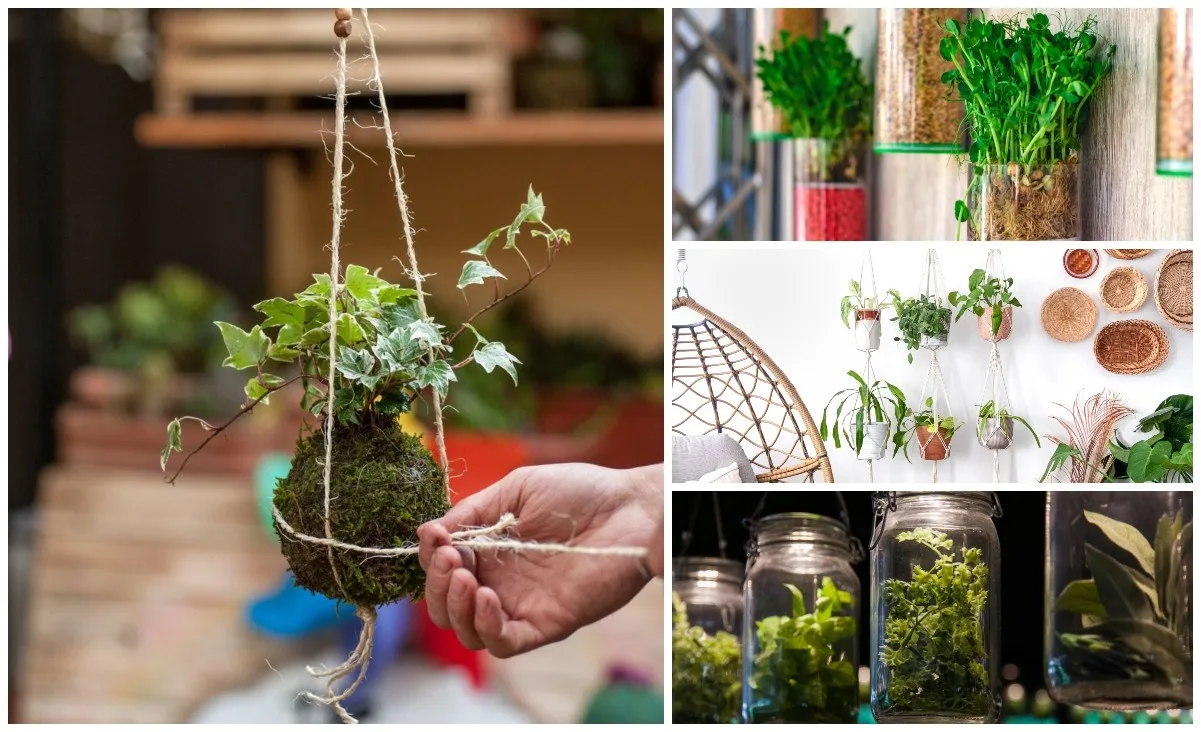
Houseplants and indoor gardening have been trending for the past few years. Are you in on the craze?
Choose from any of the houseplant statistics you like, but what really stands out for me is that 66% of American households own at least one houseplant. Once you start taking care of the first one, the next four or five, maybe even ten, are soon to follow.
We all have our reasons for bringing more green into our lives. Indoor gardening helps to relieve stress, at the same time it boosts both productivity and creativity. Many houseplants can even assist in removing airborne toxins, which is good for the health of everyone in your household, pets included.
Indoor gardening is quickly becoming a hobby across all ages, in part because it is relatively easy to learn.
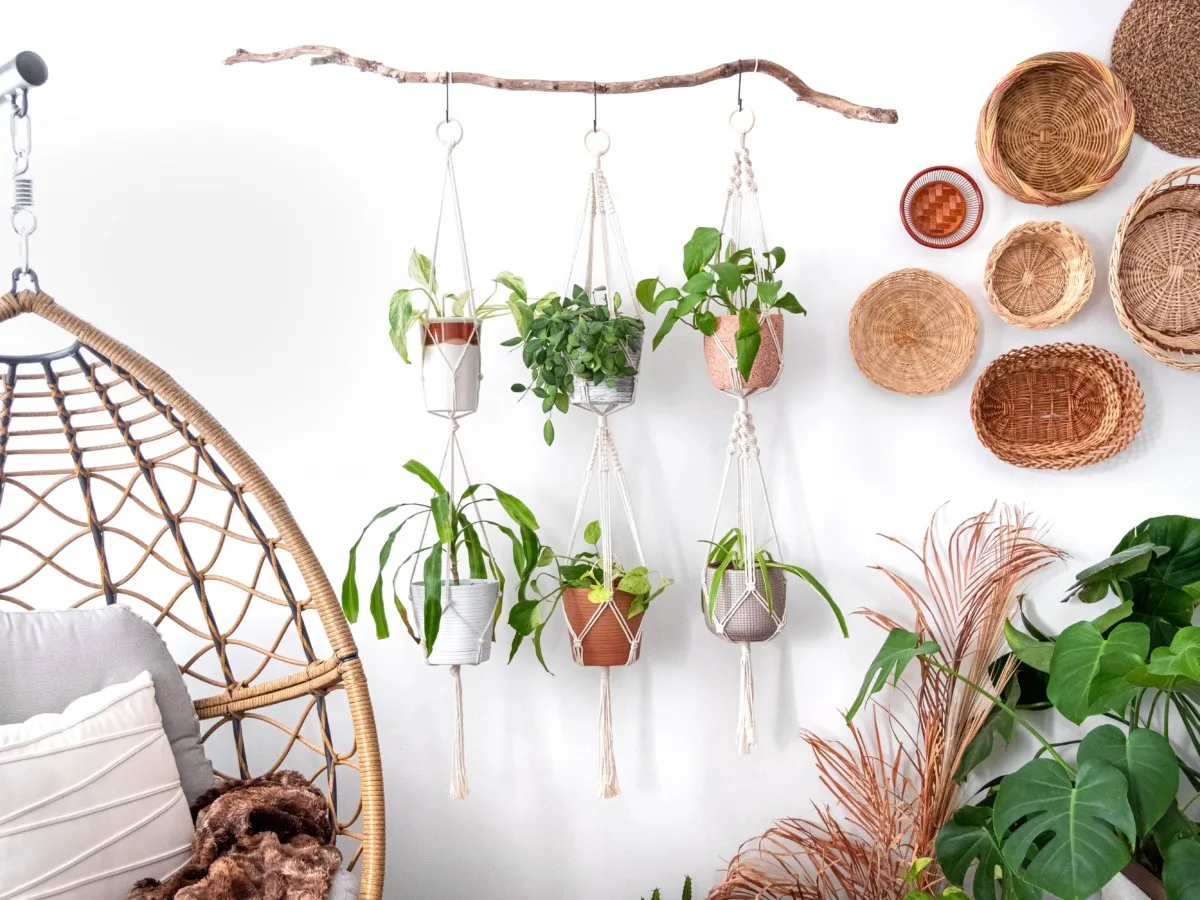
Gardening indoors can also be an inexpensive hobby when you learn how to propagate your own plants for free. In no time at all, you can fill a small space with plenty of houseplants.
Plus, you can even get some nutritious food out of the deal. It all depends on what you decide to grow.
Whether you’re going for beauty or edible herbs, you’ll find a lot of plants to choose from:
- Underrated plants are making a comeback.
- Crazy expensive houseplants are greening your space on the posh end.
- Herbs can be grown indoors all year round.
- Carnivorous plants are for serious plant keepers and so on.
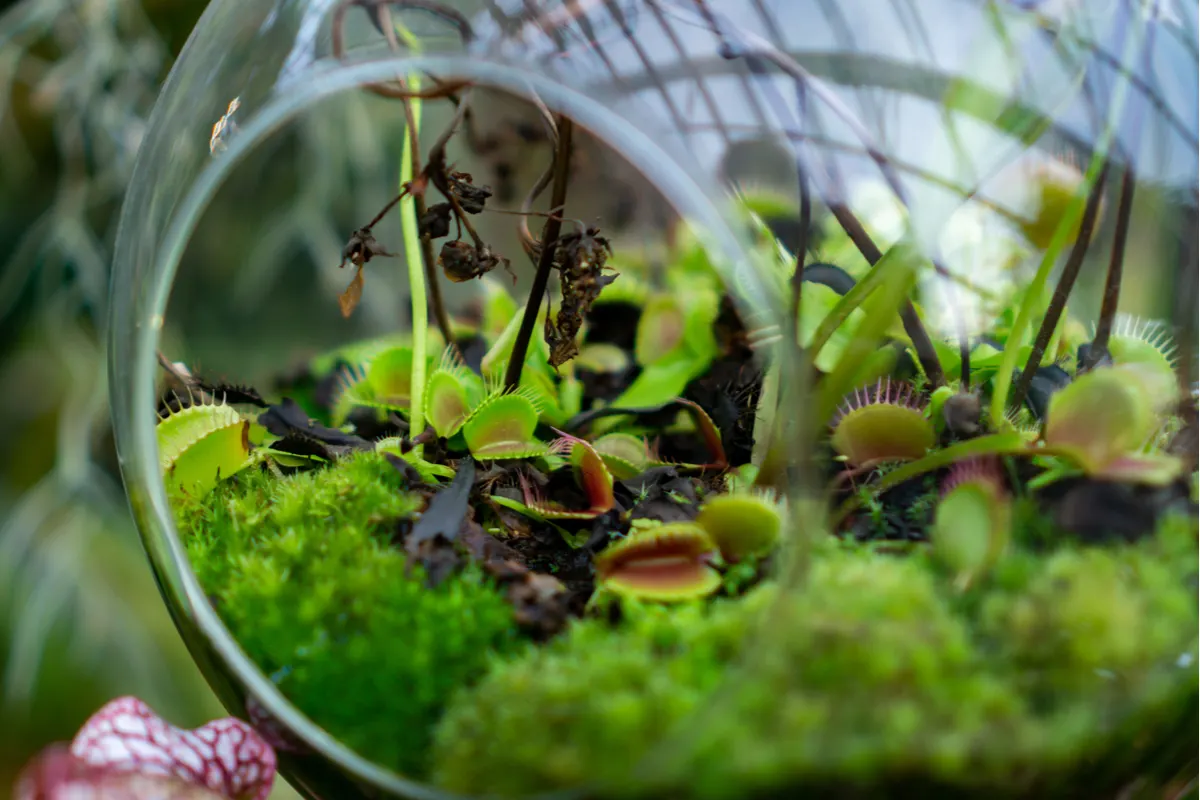
No matter what your plant style is, nature has been busy making sure there is a plant you will enjoy taking care of for years to come.
In case you are new to keeping houseplants, Tracey has you all set up with the 8 hardest to kill plants. Follow her plant expertise and you’ll have an indoor jungle in no time at all.
Where to put all those beautiful plants if you have a small space?
The problem for many gardeners is that space often feels limited. This can happen both indoors and outdoors.
Perhaps you live in a small apartment, or a tiny house, yet you still long to feel connected to nature.
Let me suggest that there is always space for one more plant. Not in the horizontal plane, but in the vertical one.
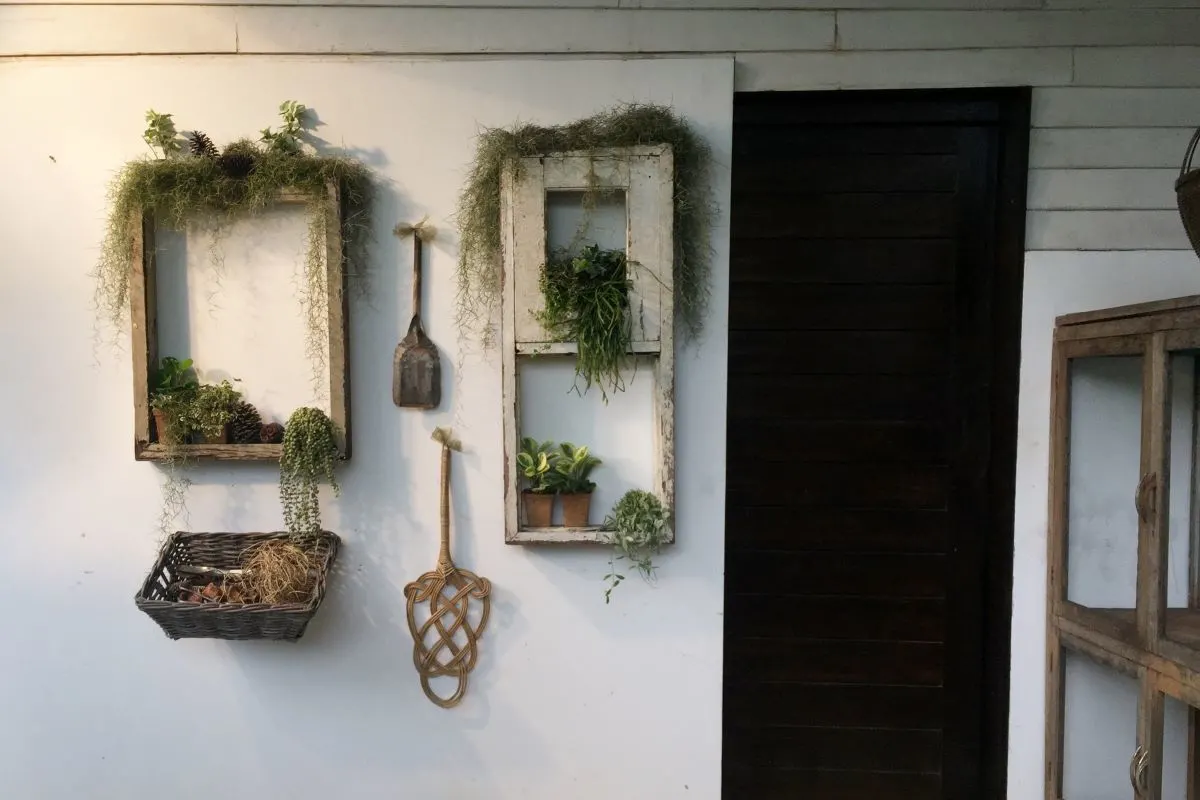
Yes, that means placing plants along the walls, on shelves and even hanging some of them. Think about it, a plain white wall is relaxing to look at, but a wall of plants is another landscape to take in.
As mentioned above, plants help to relieve stress. At the same time, they help to soothe the eyes. If you work from home, or even in an office, and you don’t get the much-needed time to get outside, you will greatly benefit from green plants in your small space.
Let’s get to the hanging garden bit – the one that allows for a lot of plants in a scaled-down space.
9 Hanging Garden Ideas For Small Spaces
When floor and table space begins to dwindle, try out a few of these easy and creative ways to hang your growing number of potted plants.
1. Living Curtains
Indoors, or out, a living green curtain is a sight to behold. You can make one above your bed, just as easily as you can grow one outdoors on a small balcony.
For starters, you’ll need to find the best location. Your living curtain should receive at least 6-8 hours of sunlight a day. We are talking optimal full sun here.
Naturally, partial shade will work too. Be aware that plants will grow slower and will be less densely covered with foliage.
The next things you must procure are pots, quality potting soil and, of course, suitable plants as well.
Trailing and vining plants to consider for an indoor green curtain are:
- climbing jasmine
- creeping fig
- philodendron
- pothos
- Swedish ivy
- spider plant
To create the curtain, you’ll need to construct a strong trellis that is capable of holding the weight of plants, soil and decorative pots.
To cover up a window with a curtain of green is a lovely sight to see. Check out these natural drape ideas and see what could work in your small indoor or outdoor space.
2. Sticks, Clothing Racks and Macrame Holders
There’s no need to get all fancy. Sometimes upcycling or bringing back a nice stick from the park will do just fine as a way to get your growing number of plants off the ground.
As long as you have strong string and a hanger, you can find a way to balance just about anything. Before hammering into your walls, however, make sure it is okay with the owner of the property. Also be aware of what is inside the walls – wiring, plumbing, etc. It’s best to use a stud finder so you are putting your hardware into something solid.
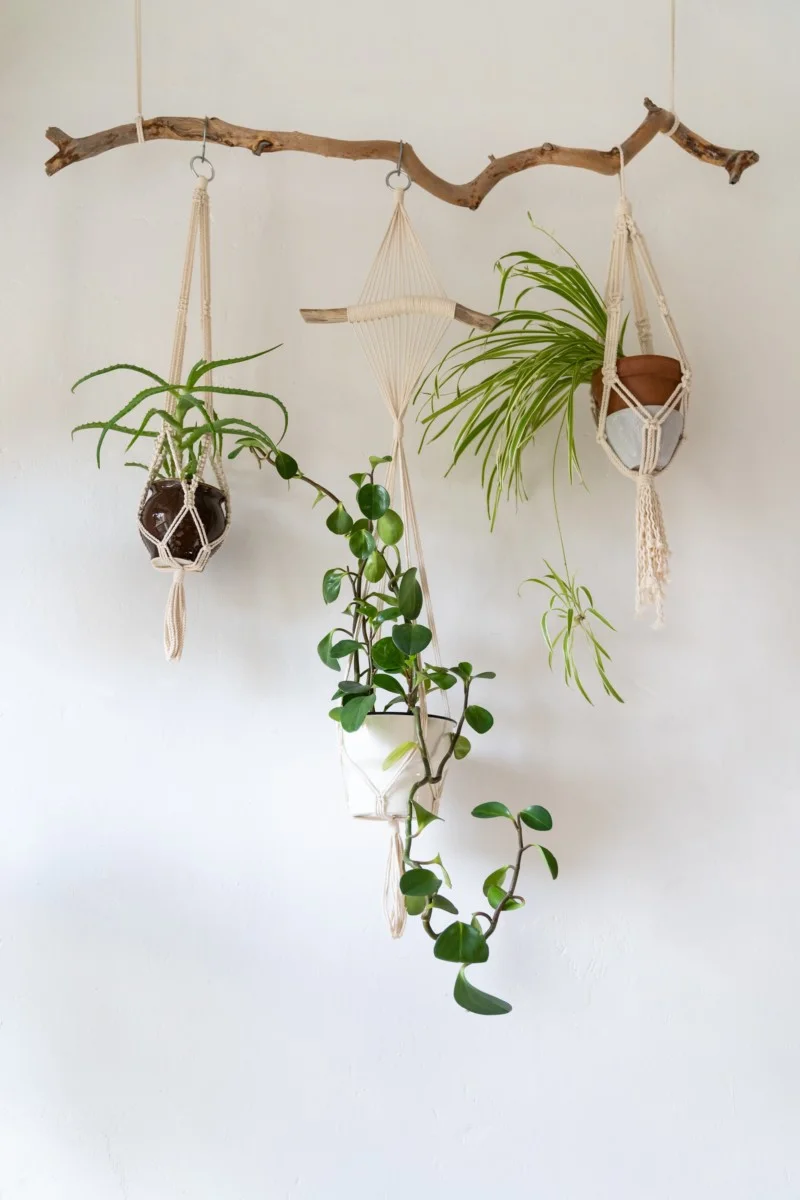
Free-standing clothes racks are perfect for dorm rooms and apartments where holes in the wall are not permitted.
A wooden or metal rack, in combination with a little DIY macrame and your small space will be prettier in an instant. Best of all, you can move it at a moment’s notice.
3. Hanging Jars
This option for an elegant hanging garden is the absolute winner for houseplants you can grow in water – no soil required.
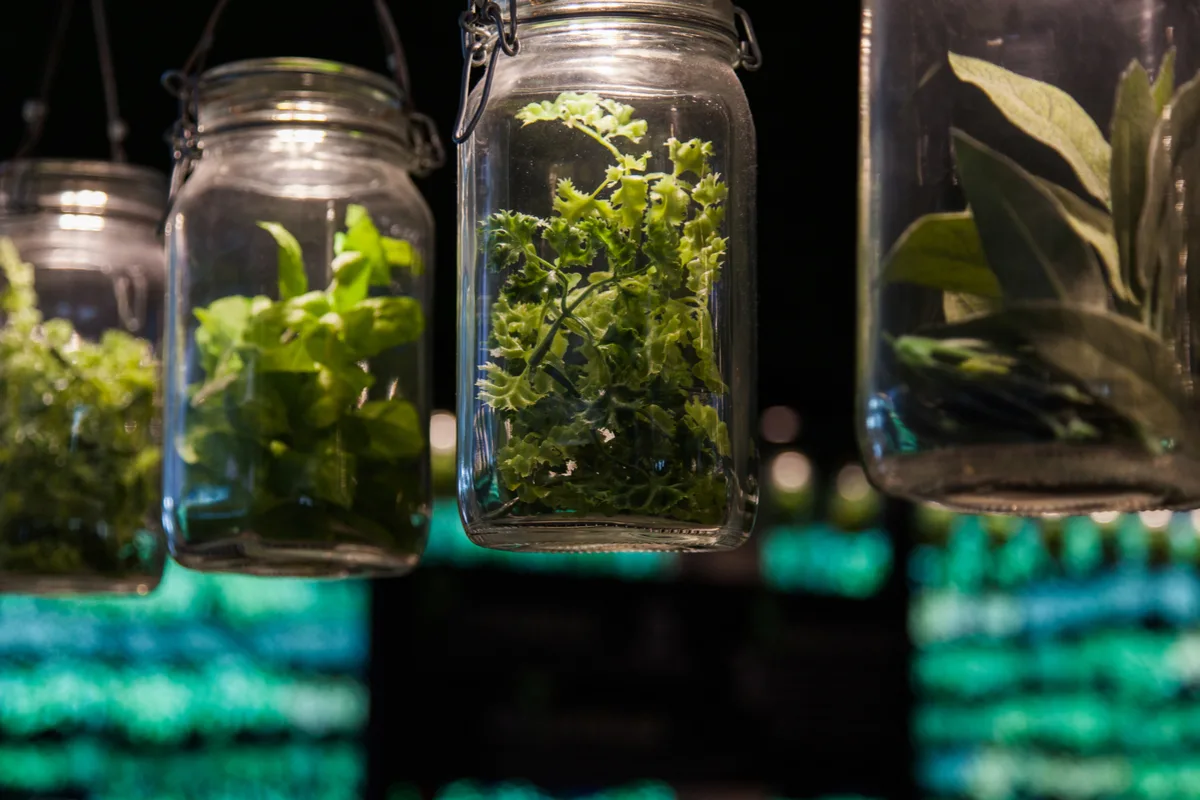
Again, macrame comes into play here as well. You can use already existing nails or coat racks, even towel hangers in the bathroom and simply hang a jar with a plant inside. Yes, there are at least 10 plants that can survive the climate of your bathroom.
It’s all very simple. And it’s called a macrame Mason jar herb planter. You could even use the Kratky method to grow your mason jar herbs.
You can give hanging jars as gifts, make them for sale, or keep them all for yourself.
Whatever you do, take the time to green your small space with a few calming herbs.
4. Wall-Mounted Planters
More than just a hanging jar, wall-mounted planters are for the plant keeper with more than enough plants. If you are guilty of accepting stray plants that are unwanted by others, you’ll need some serious space for vertical gardening.
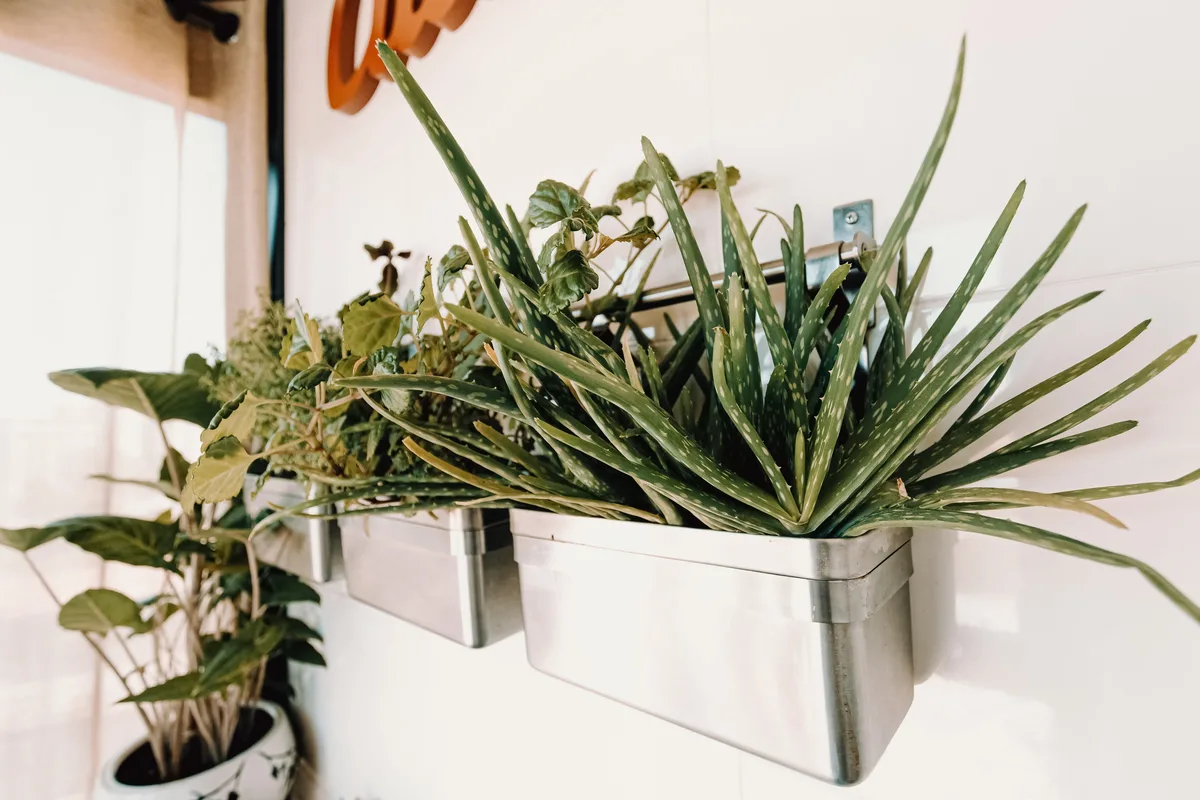
Your wall planter options range from total DIY to plastic and ceramic store-bought versions.
Again, there is something for every style here. With so many to choose from, it’s hard to know where to get started.
Personally, I’m partial to hanging woven baskets made from wicker, willow, hemp or jute.
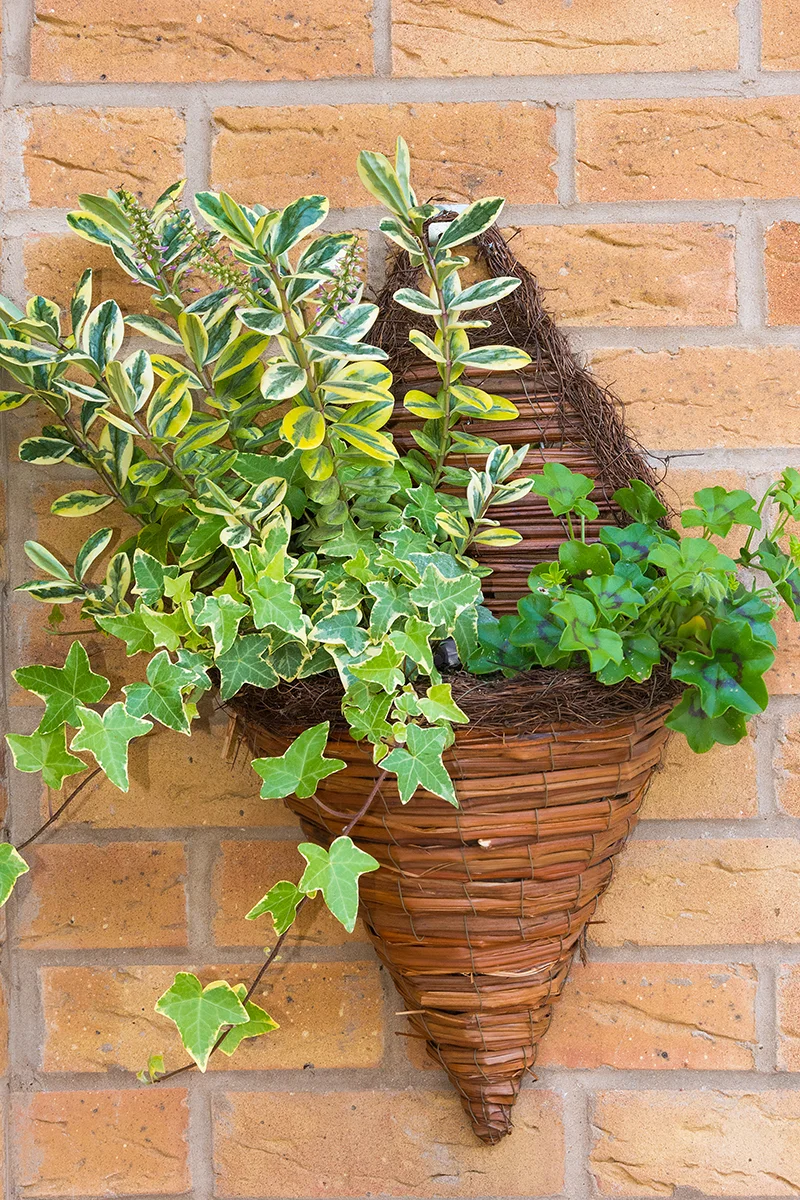
As for the plants you can hang – use your imagination and go wild. The ceiling is the limit.
5. Succulent Wall Frames
Propagating succulents is an easy enough task where material can be taken from leaf, stem or branch cuttings of older succulents.
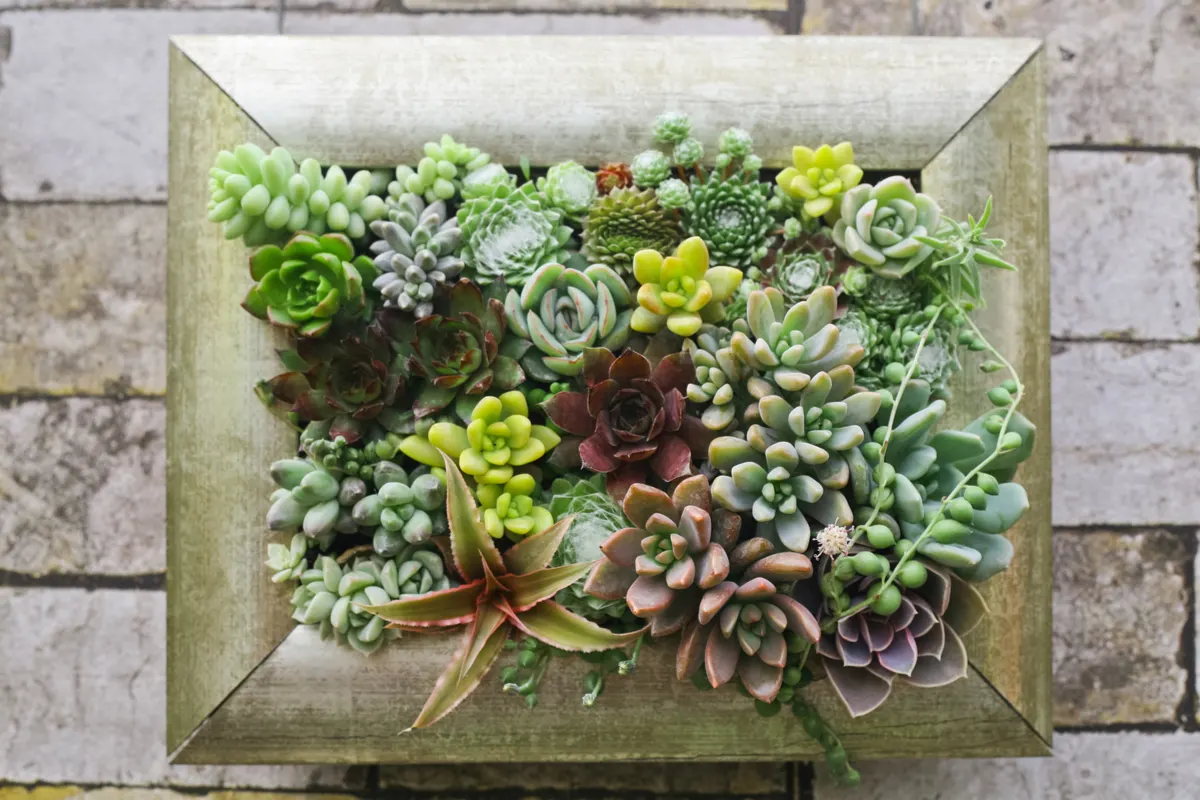
Meredith has a fantastic article about how to propagate succulents; follow her advice and you’ll fill your small space with these charming plants in a short amount of time.
As your new plants begin to grow roots, think about how you could make (or buy) a frame for them. In the end, it will look like a living picture. It’s creative, it’s green, it hangs on the wall. What more could you ask from a group of succulents?
For inspiration to get started, work your way through this beautiful tutorial: Make This: Easy DIY Succulent Wall Planters by Sunset
6. Kokedama: Japanese Moss Balls
Whereas Chinese culture has brought us feng shui, Japanese culture has cultivated another interior design concept known as kanso. Kanso emphasizes simplicity, at the same time being a minimalist approach to design where zen can flourish. In a small space, loving what you own is essential.
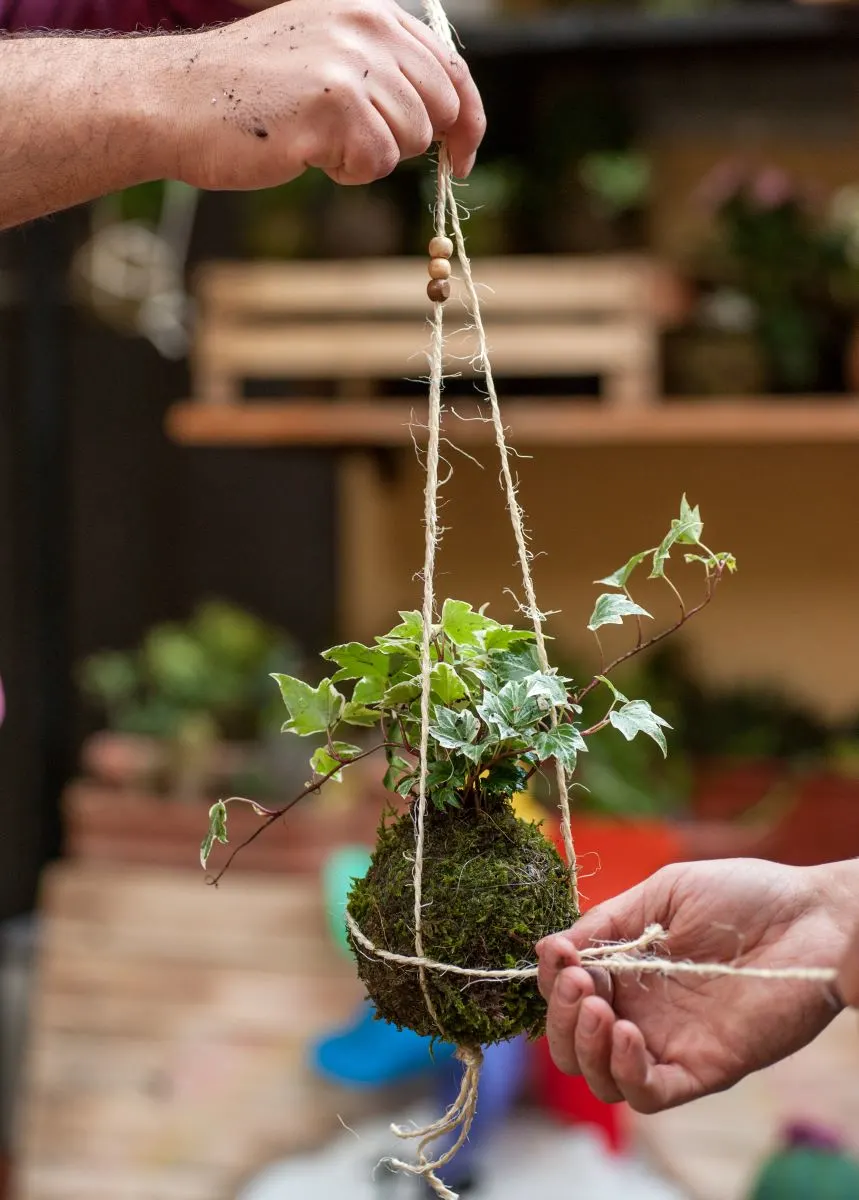
Enter the Kokedama. A simple moss ball which is a form of Japanese garden art. It has the amazing ability to change your indoor environment in a matter of minutes.
Once “planted”, these moss balls can be hung from the ceiling, attached to a piece of driftwood or supported by a vase. You can even imagine this as a string garden. Learn how to make your own kokedama moss balls here.
As a side note: For some time now, I’ve been fascinated by dorodango. If you are also into creating with clay, you might want to check out some mesmerizing videos of the process.
7. Hanging Terrariums
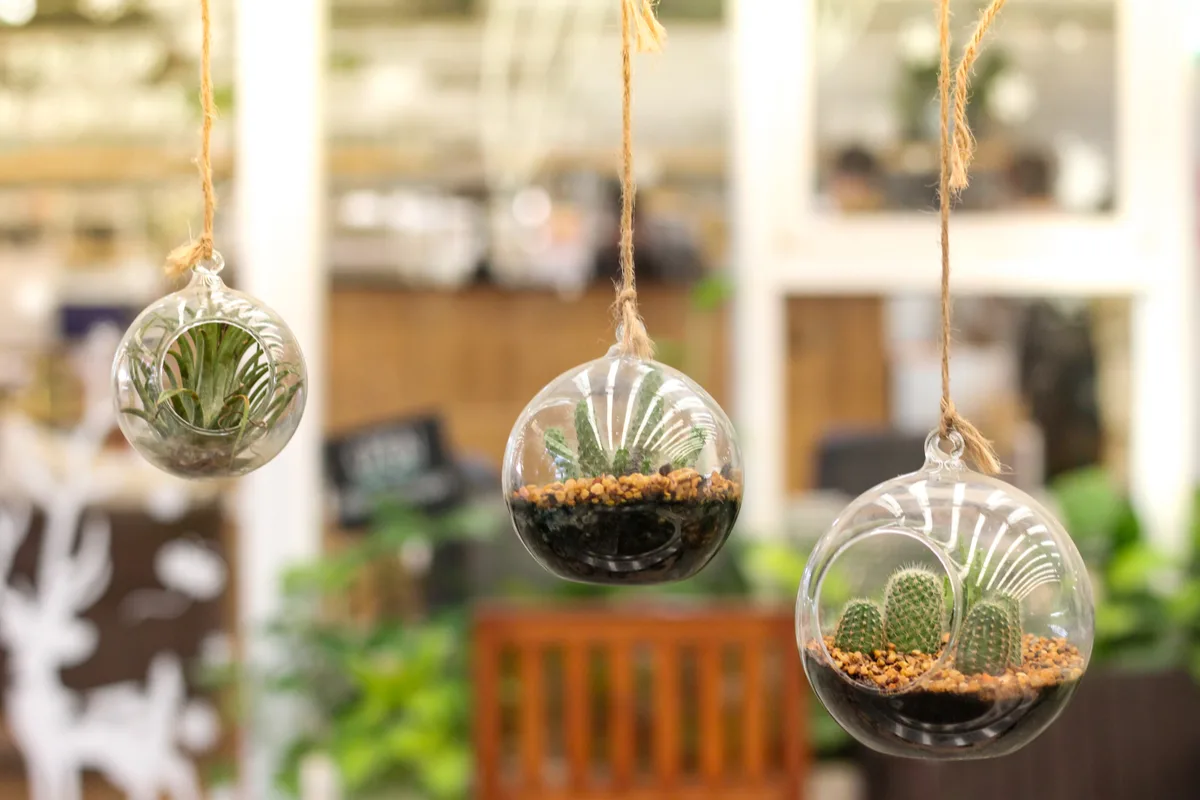
Hanging gardens can support many varieties of greenery to brighten up your small space.
In the case of hanging terrariums, first and foremost you’ll need to choose globes, light bulbs or jars that are easy to support.
They are fun, whimsical and even a bit quirky. Not only do hanging gardens cater to succulents, they also work well with:
- ferns
- moss
- mondo grass
- cacti
- pothos
- peperomia
- and small begonias
Discover more hanging terrarium ideas here:
- 11 Beautiful Hanging Terrarium Ideas + DIY Inspiration from Love and Lavender
- DIY Hanging Terrariums Using Live Plants from Afloral
- How to Make Your Own Mini Hanging Succulent Terrarium from The Practical Planter
8. Wire Wall Grid
Wire grids were once popular for photos. Now, that you tend to keep your photos in the digital realm, why not use that same wire grid for small plants instead?
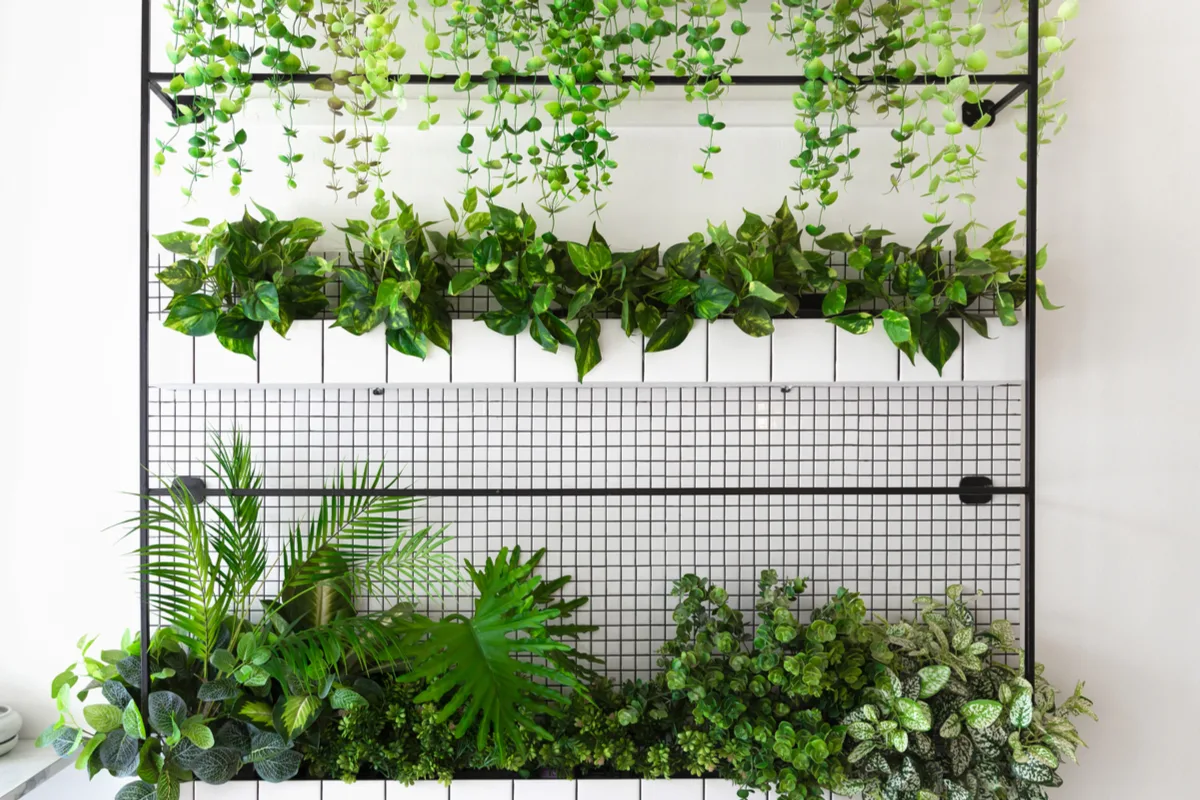
As long as it is sturdy enough, you can use it for plants galore. Even turn it into an herb wall in the kitchen.
There are a myriad of ways to accomplish the greening of your home with vertical growing.
If you choose to get really creative about it, a wire wall grid combined with some elements of wood could even become a green room divider.
Here’s one way you could make a Green DIY Wall Planter for your own small space.
9. Mounted Air Plants
Air plants (Tillandsia spp.), a species of epiphyte, are otherworldly greens that forgo the soil in favor of air and rainwater.
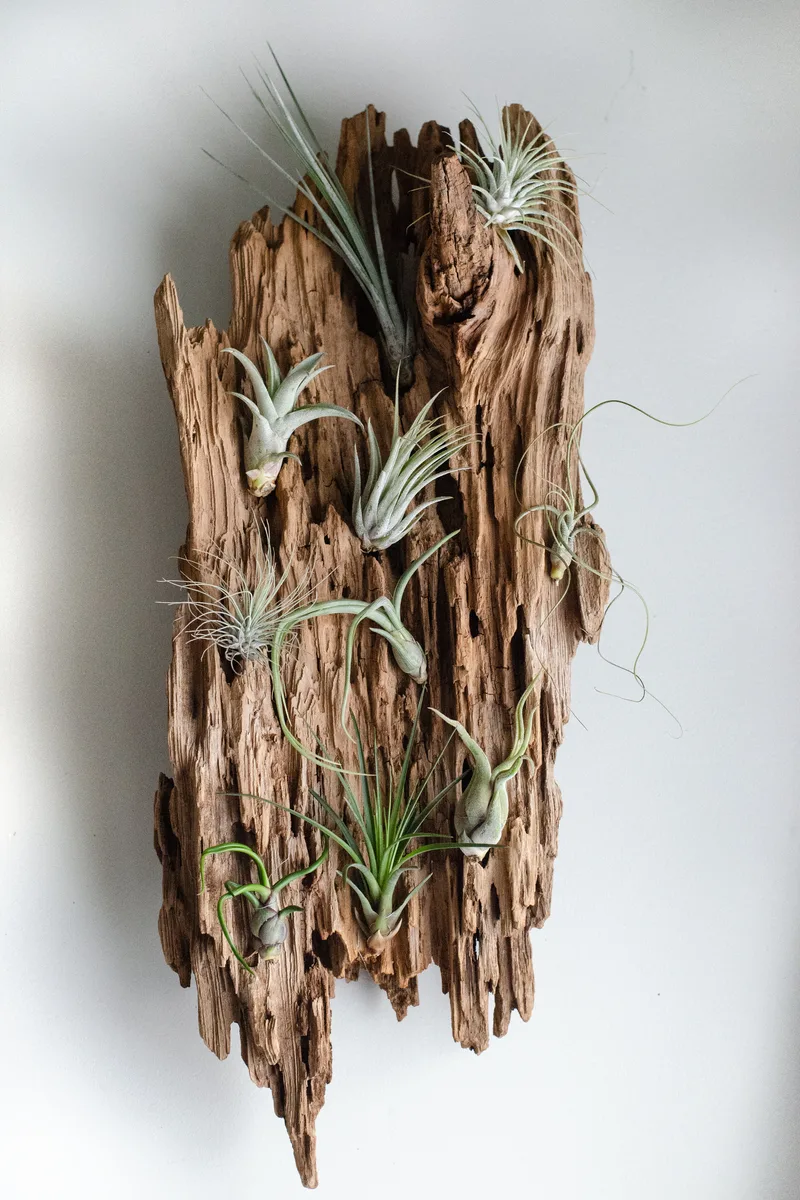
Or in the case of an indoor epiphyte, that rainwater can come in the form of a spray bottle. If your plant is suffering from lack of moisture, you can also submerge it in water, a little bath if you will, for about half an hour or so. Then remove it and hang it back up on the wall or return it to its tray.
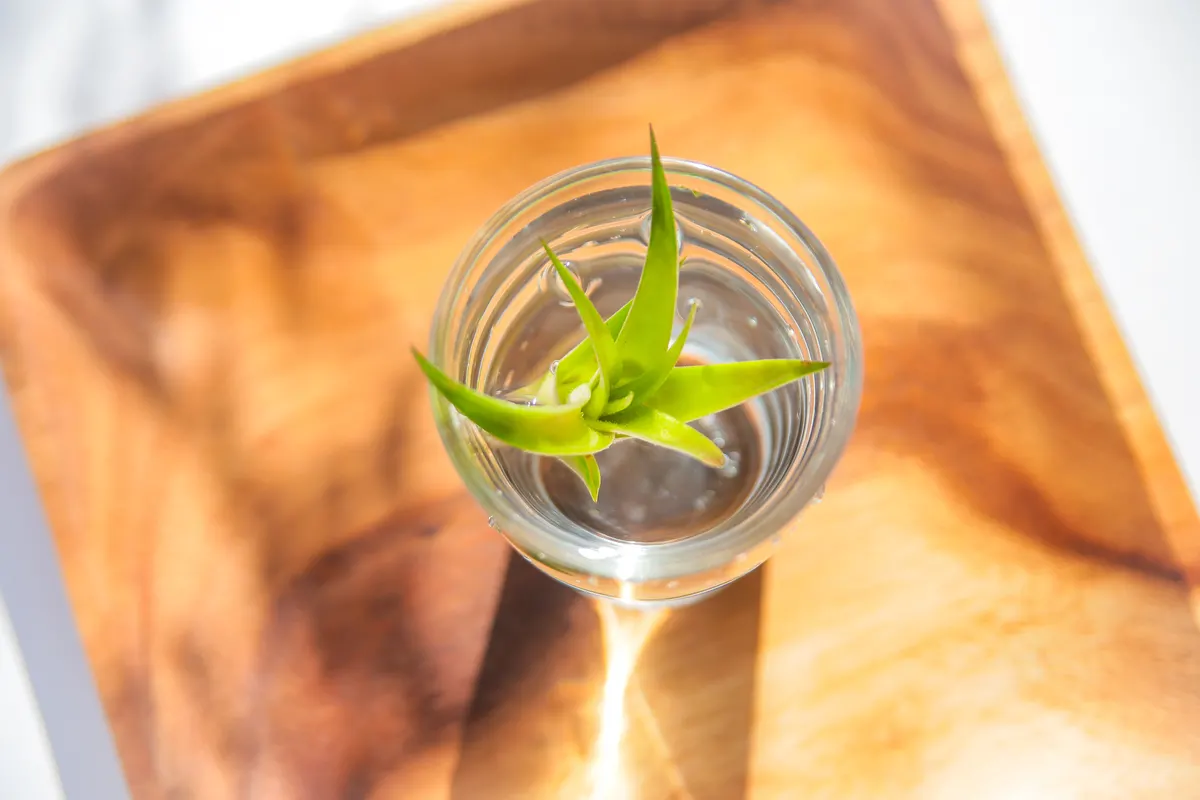
Like the succulent wall trays, air plants also look great when mounted onto a wooden board. Sometimes they can be found at a nursery specializing in epiphytes, but you can also make your own mounted staghorn fern. Best of all, it’s a decorative living species that will receive all sorts of positive comments from your visitors.
In a small space, a little bit of green goes a long way.
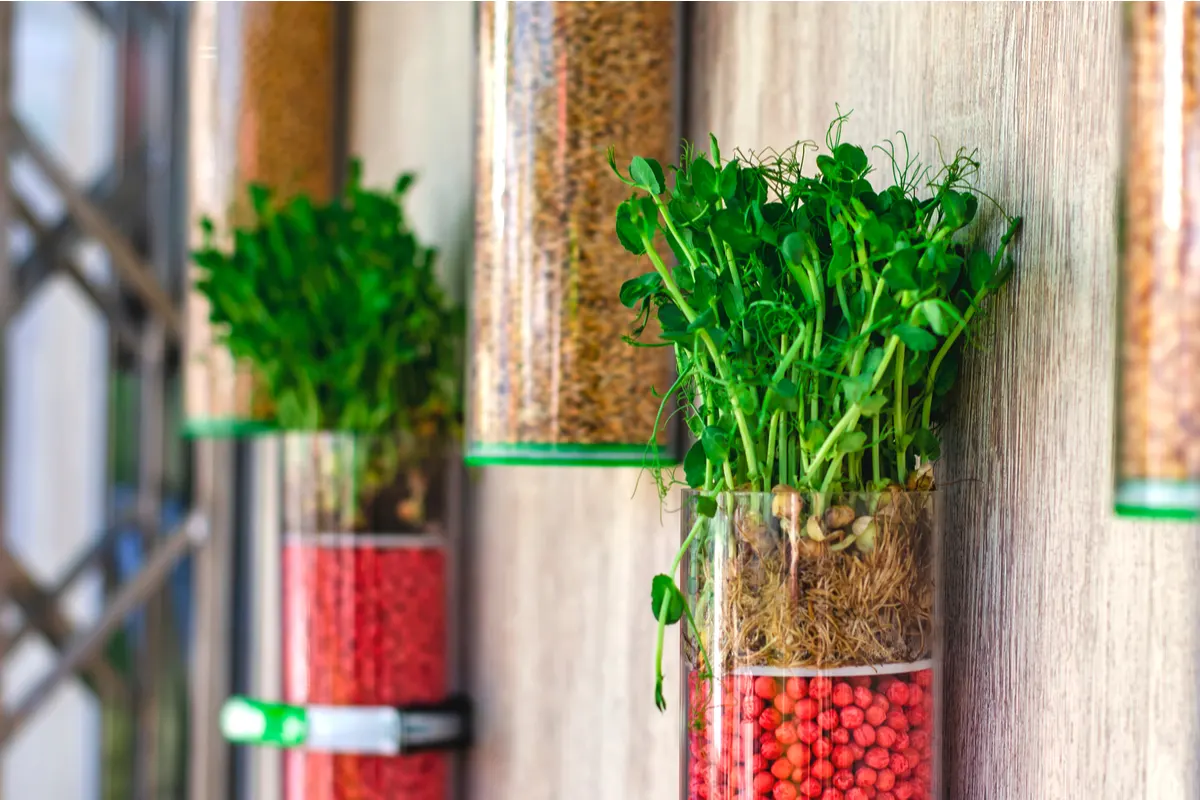
Start potting up those favored houseplants and herbs and get to hanging them when you run out of horizontal space. Then allow the relaxing, stress-free atmosphere to put a happy smile on your face.
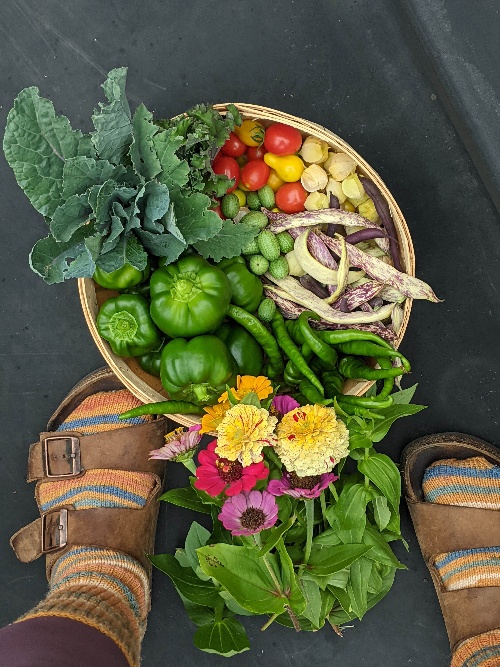
Get the famous Rural Sprout newsletter delivered to your inbox.
Including Sunday musings from our editor, Tracey, as well as “What’s Up Wednesday” our roundup of what’s in season and new article updates and alerts.

